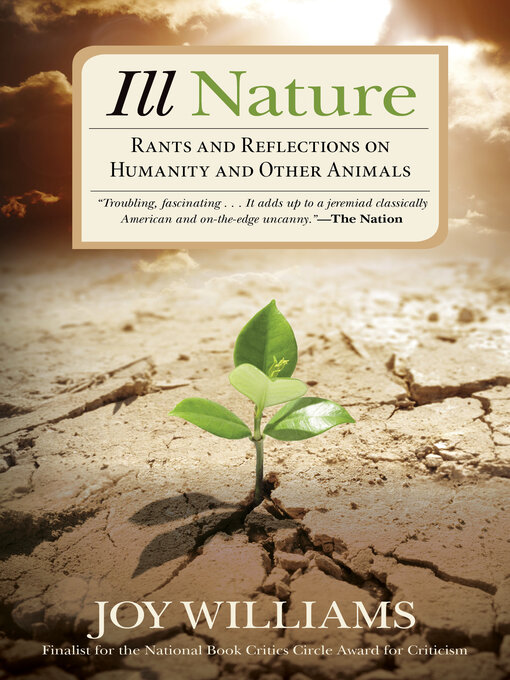-
Creators
-
Publisher
-
Release date
October 10, 2015 -
Formats
-
Kindle Book
-
OverDrive Read
- ISBN: 9781493023714
- File size: 534 KB
-
EPUB ebook
- ISBN: 9781493023714
- File size: 534 KB
-
-
Languages
- English
-
Reviews
-
Publisher's Weekly
February 1, 2001
Sharp, sarcastic and uncompromising, Williams tackles a host of controversial subjects in this collection of 19 impassioned essays dealing mostly with humans' abuses of the natural world. Two of the collection's strongest essays deal with animal rights: "The Killing Game," an antihunting essay first published, to great furor, in Esquire, and "The Animal People," which casts a harsh eye on the agricultural, medical and environmental establishments for their treatment of animals. Other pieces note the diminished state of African wildlife ("Safariland"), the increasing number of babies born in the United States despite the threat of overpopulation ("The Case Against Babies") and the impact of consumer culture on the natural world ("Save the Whales, Screw the Shrimp"). An acclaimed novelist (The Quick and the Dead) and Guggenheim fellow, Williams writes that her essays, unlike her stories, are "meant to annoy and trouble and polarize"; she terms her own nonfiction style "unelusive and strident and brashly one-sided." Readers will likely find all this true. At times, the collection falters under the weight of Williams's anger and moral indignation, and a few essays that are only loosely nature-related ("Sharks and Suicide," "The Electric Chair" and "Why I Write") undermine its momentum. However, her forceful writing and vivid depictions of habitat destruction and animal abuse ("Neverglades," "Wildebeest") make for compelling reading. Williams believes that the "ecological crisis" facing us is essentially a "moral issue," one caused by "culture and character, and a deep change in personal consciousness is needed." While it is unlikely that her combative rants will win new converts, some environmentalists may find this book a powerful call to action. -
Library Journal
February 1, 2001
This is not a comfortable book; nor can it be cast aside as just another tiresome list of environmental ills. In this collection of essays, Williams decries the ecological devastation caused by development, technology, and an out-of-control population. She minces no words in her treatment of hunters, wildlife managers, scientists who use animals in research, and a general public addicted to consumerism. Her writing is heavy with sarcasm and irony. It is also compelling, and the ten chapters go quickly. Williams is a seasoned writer, the author of several works of fiction (The Quick and the Dead) as well as nonfiction and recipient of a National Magazine Award for Fiction. Although the chapters "Sharks and Suicide" and "Hawk" diverge from her environmental theme to follow other musings, as a whole the work is effective and will likely leave the reader angry, frustrated, distressed, or depressed, which is, after all, her intent. Highly recommended for environmental and general collections.--Maureen J. Delaney-Lehman, Lake Superior State Univ., Sault Ste. Marie, MICopyright 2001 Library Journal, LLC Used with permission.
-
Booklist
February 15, 2001
Sharp and satiric in her novels, which include " The Quick and the Dead" [BKL O 1 00], Williams is even fiercer in her essays. She will not soft-pedal or sweet-talk; she means to incite, rattle, and pique. Extremely well informed, Williams writes, in a froth and a fury, about the ravaged state of nature. In "Safariland," she both marvels at the wonder of elephants and vanquishes the fantasy that wildlife still roams free in Africa. Williams calls the Everglades the Neverglades because that great wilderness is no more. She cuts through the self-serving rhetoric hunters spin to justify their lust for blood; questions extravagant artificial insemination procedures; and bluntly describes the brutal transformation of animals into myriad, thoughtlessly consumed products. And she looks directly into the heart of wildness in wrenching tributes to a beloved dog who suddenly turned vicious and to the fabulously crazy punk-rock performance artist Wendy O. Williams. These howls, protests, and pleas for sanity are lacerating, brilliant, and necessary.(Reprinted with permission of Booklist, copyright 2001, American Library Association.)
-
Loading
Why is availability limited?
×Availability can change throughout the month based on the library's budget. You can still place a hold on the title, and your hold will be automatically filled as soon as the title is available again.
The Kindle Book format for this title is not supported on:
×Read-along ebook
×The OverDrive Read format of this ebook has professional narration that plays while you read in your browser. Learn more here.



